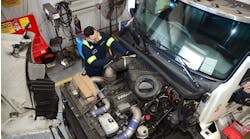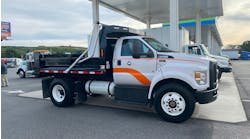With some in the industry concerned with meeting increasingly stringent emissions regulations, especially in California, California Air Resources Board (CARB) gave fleets operating in the state some breathing room in regards to the Clean Truck Check program. On Dec. 27, CARB extended the reporting deadline from Jan. 1 to Jan. 31, 2024.
The extension grants heavy-duty truck owners and operators an additional month to enter their vehicle and personal information in the Clean Truck Check-Vehicle Inspection System (CTC-VIS) database, finalize their initial reporting requirements, and pay their compliance fees for 2023. First approved by CARB in 2021, this completes the programs second phase. Phase 3 set to begin in July 2024.
While the additional time can't hurt, Allen Schaeffer, executive director of the Engine Technology Forum, already anticipates that the program’s official implementation will be “barely a speed bump” for fleets already operating in the state.
“I think most of the fleets operating in California are familiar with the emissions inspection requirements...to make sure that they're maintaining the vehicles properly,” Schaeffer explained. “So I don’t see [CARB’s new Clean Check program] as being a problem at all.”
In contrast, the executive director noted that CARB’s July agreement with the Truck and Engine Manufacturers Association was the “most significant” change for the industry at large. The deal saw several prominent engine manufacturers, such as Cummins and Daimler Truck North America, agree to meet CARB’s zero-emission and criteria pollutant regulations, even if other entities challenge those regulations. In return, CARB agreed to adhere to the Environmental Protection Agency’s 2027 regulations for NOx emissions, including modifying their 2024 NOx emission regulations, for which manufacturer's will handle any offsets to meet the state’s emission targets.
“What that did was harmonize the federal, tighter 2027 nitrogen oxide (NOx) rules and what CARB had proposed that would start taking effect next year, which were more stringent than the federal level,” Schaeffer stated. “I think that's really good news for folks who are going to be buying trucks in the future, because it takes away a lot of uncertainty from the manufacturers.”
Read more: Some small fleets lean into EV benefits as CARB rules loom
Additionally, CARB committed to providing at least four years of lead time on any new regulations and at least three years of regulatory stability before adding new rules, granting manufacturers greater certainty for product development.
“I think it will result in the availability of more products,” Schaeffer said. “One of the things we had heard about when California's rule took effect was, ‘Oh my gosh, it costs so much to certify these engines to sell in California, and they have one standard, and EPA might come out with another one.’ That's all compliance calls for manufacturers.”
Without the agreement, Schaeffer noted that this could have resulted in the certification of only two or three engine families instead of eight or 10, which would have severely limited fleet choice in terms of powertrain and horsepower ratings.
“Thankfully, this agreement should alleviate those kinds of concerns,” the executive director noted.
As for fleets preparing for the Clean Truck Check program, once the Jan. 31 deadline has passed, the next projected deadline is at the beginning of July. At that point, vehicle owners will need to report their smog check results in the CTC-VIS database, ensuring that their emissions control devices are working well or have received any necessary repairs. Testing compliance dates for heavy vehicles registered with the DMV after January are as follows:
Read more: How to prep for California's Clean Truck Check program
For a heavy vehicle to be compliant under the program, the owner and vehicle information must be registered in the online database, the $30 compliance fee must be paid, and the periodic testing requirements must be met by the above deadlines. These expectations currently apply to vehicles with a gross vehicle weight rating over 14,000 lbs. with diesel or alternative fuel engines that are registered to Calif. or will travel within the state.





